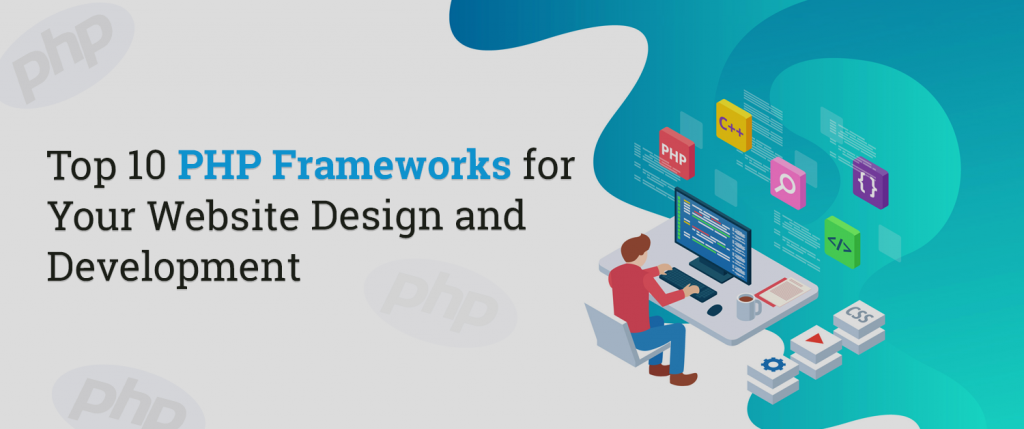
The use of the PHP framework has become compulsion while working with PHP. It essentially makes it easier to grow your application over time and scale. PHP stands for the personal home page, or we could say hypertext preprocessor. PHP framework provides the basic structure for streamlining the development of web apps. It speeds up the development process. So, if you’re starting with any PHP project, you should consider picking up the correct and latest PHP framework. Here we have carefully handpicked ten popular PHP frameworks that can provide an adequate solution to developers. But before that, it is crucial to know what is a PHP framework.
What is Framework in PHP?
PHP, also known as the most popular server-side scripting language, has evolved a lot since its development. From its first inline code snippets to intricate web designing, it has always provided developers with an appropriate solution. But building web applications using static HTML files can be tiresome and consumes a lot of time. Hence came the need to build a more structured way for development. PHP framework not only simplified the developer’s tasks but also facilitated and streamlined the backend development process. The responsiveness of applications and websites which are built using PHP frameworks helps businesses fulfil their needs. According to a survey, over 80% of the websites worldwide make use of PHP Framework. Either you are a beginner or a or an expert, the PHP framework will always help you in completing your projects efficiently. Besides facilitating rapid development, it also provides a simplified structure for the development of a web app.
Let’s Discuss Benefits of PHP Framework
1. No Need to Recreate Functions
PHP frameworks eliminate the need to recreate functions that have already been created by providing a foundation for development. It provides a code generation feature that enables developers to keep source code clean and maintainable.
2. Easy to Use
The syntax of the hypertext preprocessor is somewhat similar to the C programming language. So anyone familiar with the C language can quickly learn to create PHP website scripts.
3. Secure Platform
PHP framework contains in-built features for security. The mechanism provided by the framework makes it easy for programmers to secure the website from existing or emerging threats. It also helps websites to stay secure from common threats like SQL injections, data tempering, cyber attacks, and so on.
4. Simplify Web App Maintenance
Unlike other web development platforms, PHP simplifies web application development and support by following MVC architecture. MVC divides the model into three parts viz., model, views, and controllers. Also, it keeps the application’s user interface and business logic layers separated and easy to maintain.
5. Easily Syncs With Database
Last but not least, the PHP framework offers users to work with a wide variety of relational databases. It also provides object-relational mapping(ORM) so that users can perform database operations without writing lengthy codes. No doubt, the above benefits surely make any organization stand out from the competitive market. There are, however, some pros and cons of widely used PHP frameworks. They differ from each other in the category of functionality, usability, and performance.
Top 10 PHP Frameworks for Your Website Design and Development
1. Laravel
2. Codeigniter
3. Symfony
4. Yii Framework
5. CakePHP
6. Zend Framework
7. Phalcon Framework
8. Slim Framework
9. Fat-Free Framework
10. FuelPHP
1. Laravel

Laravel is, at present, one of the best PHP web application frameworks available to programmers. Designed in the year 2011, it rapidly builds an application using MVC architecture. It is easy to understand and implement, making it the first choice for web developers.
Features
- Lightweight blade templating engine
- Runs task asynchronously in the background.
- Packaging system
- Restful controllers
- ORM
Pros
- It is not only easy to understand and implement, but it also is lightweight and secure.
- It is robust and has simple and elegant syntax.
- You can rapidly work on projects and could also easily integrate with other third-party software.
Cons
- No scope of modifying core features.
- It has less inbuilt support as compared to other frameworks.
2. Codeigniter
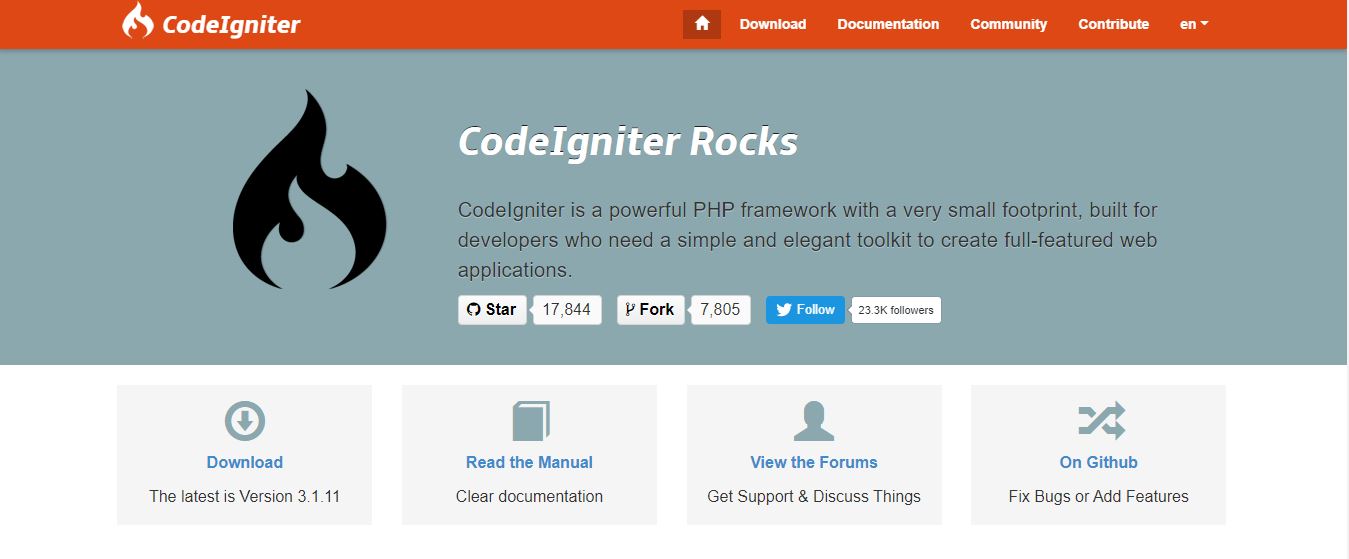
Released in 2006, Codelgniter is the second most popular framework and is worldwide used for web app development. It is simple but powerful. Speed is one of the strengths of CodeIgniter. As compared to other PHP frameworks, it runs faster with database tasks.
Features
- Uses MVC architecture to handle specific development tasks.
- It enables the user to build highly-scalable web applications with smaller footprints.
- It comes with built-in libraries for form validation, unit testing, and built-in security features.
Pros
- It offers reliable performance with a lightweight framework.
- You can use your coding and naming conventions.
- It offers excellent and straightforward documentation.
Cons
- It does not support the modular separation of code.
- Poor 404 error handling.
3. Symfony
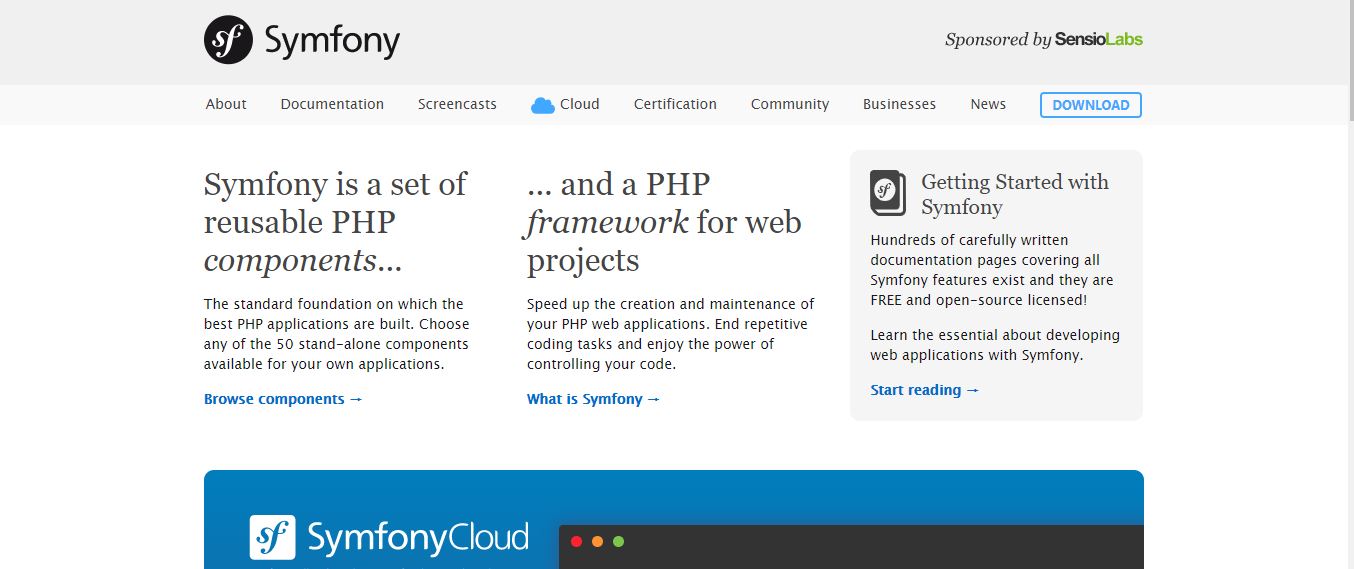
When it comes to large scale development projects, Symfony is the perfect choice among the PHP Frameworks. Components of the Symfony framework, are very much used by content management and is also supported by an active community of developers.
Features
- Includes built-in testing functionalities to ensure smooth working of applications.
- Offers users to create their naming conventions.
- Quickly build high-performance, complex web applications.
Pros
- Flexible framework and excellent documentation.
- Available in Open Source MIT license.
- It reduces the overall development cost.
Cons
- It does not handle file-parsing very well.
- The security mechanism is not easily implemented.
- Small-scale web applications can not use it.
4. Yii Framework
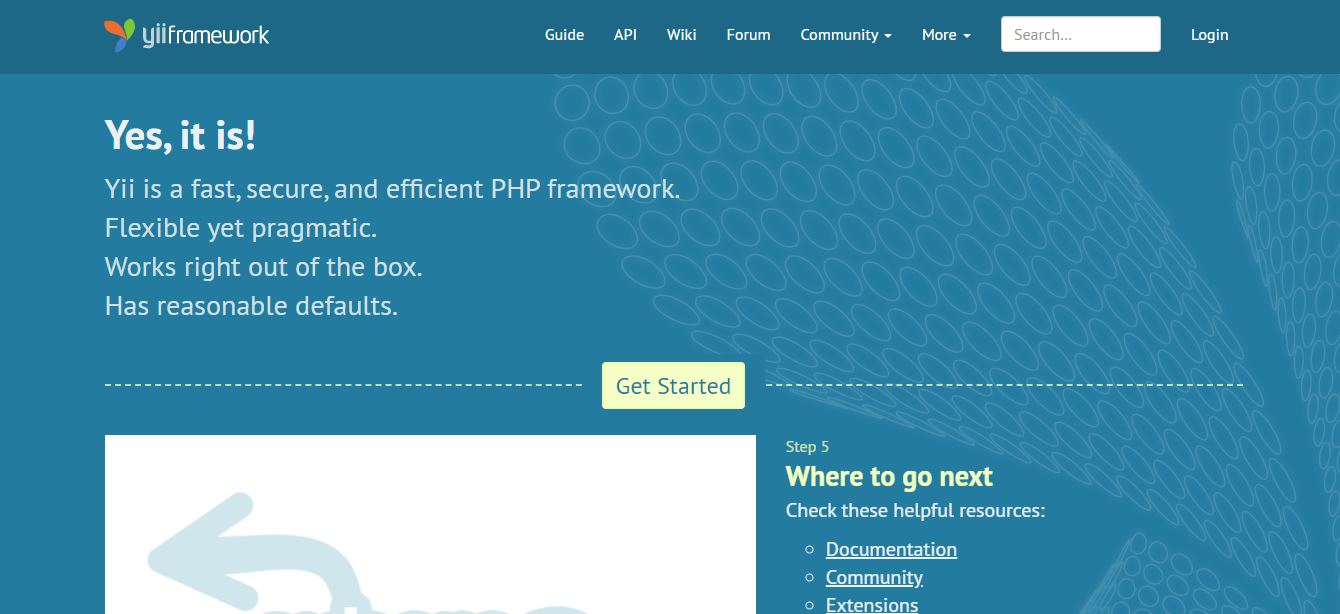
Yii, one of the oldest frameworks, has come up with the latest version Yii 2 to get a much-needed popularity boost. It is compatible as compared to the other platforms. Yii framework has a simple, hassle-free syntax that allows programmers to manipulate its inbuilt functions to create any website easily.
Features
- Allow users to modify their built-in functions to create websites.
- Eliminates the need to write repetitive SQL commands.
- Universal web programming framework.
Pros
- It offers a greater degree of compatibility with other platforms.
- High performance and speed.
- Creates secure applications.
Cons
- It does not provide AR queries.
- Difficult for beginners to understand
5. CakePHP

CakePHP is again a decade old and still among the most popular PHP frameworks. It is best suited for commercial web applications and makes web development quite easy to use for programmers.
Features
- It offers code generation and scaffolding functionality to boost up the development process.
- Provides users with database access and caching.
- It offers built-in security features like SQL injection protection, cross-site scripting protection, form tampering protection, etc.
Pros
- The ideal framework for beginners.
- Portable across many platforms.
- It provides proper documentation with great support portals.
Cons
- It does not support default routes to fancy URLs.
- Unlike other frameworks, it only provides one-way routing.
6. Zend Framework
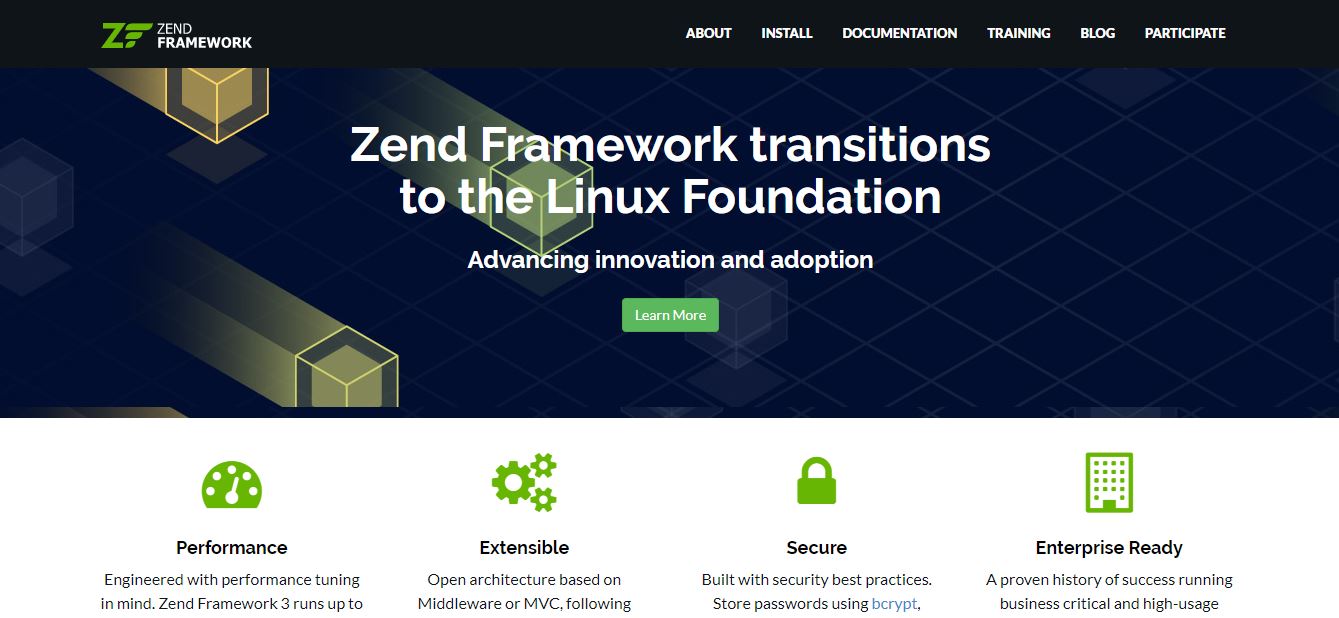
An open-source web framework, Zend has a collection of PHP based packages. It is based on the modern view controller and also supports front controller solutions. Zend Framework also provides support to database systems.
Features
- It has built-in components for authentication, forms, services, and more.
- It has a collection of professional based packages.
- It provides use-at-will architecture, flexible caching, and RESTful API development.
Pros
- It offers developers to implement their variations of components.
- Easily integrates with external libraries.
- It offers users to re-use their codes seamlessly.
Cons
- Not ideal for rapid application development.
- Pretty complex to pick-up.
7. Phalcon Framework
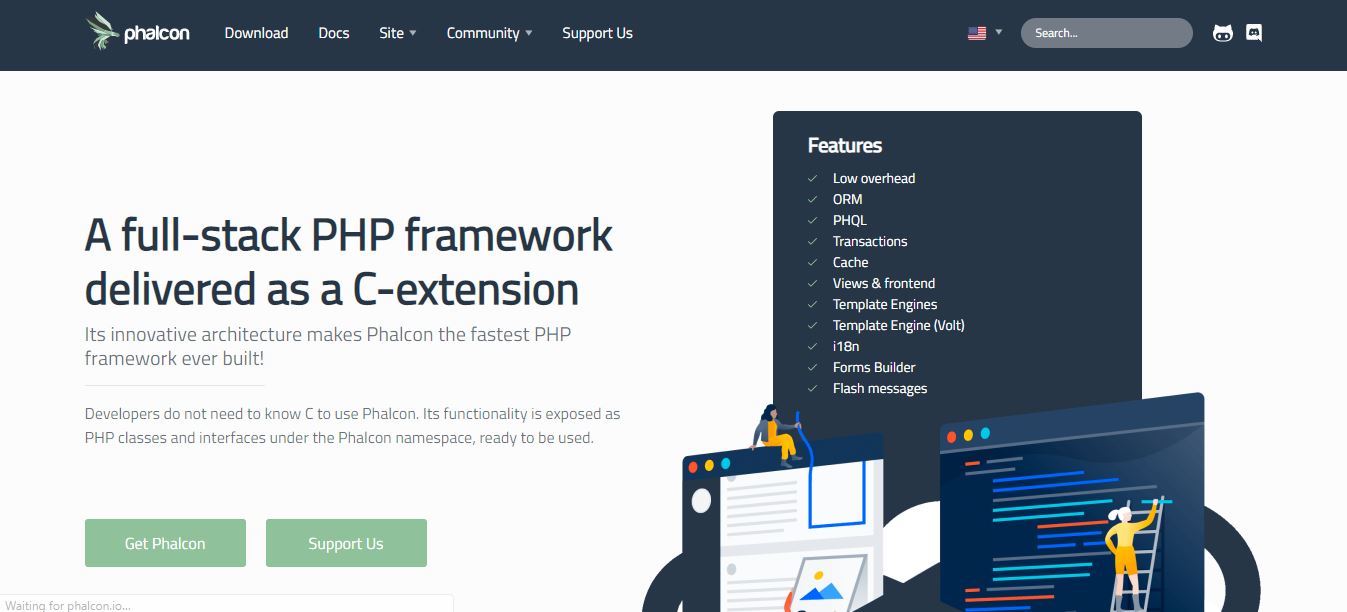
Phalcon is an open-source web framework developed in 2012. It was initially written in C and C++. Phalcon is easy to install and is used to create highly configurable web applications that are lined with enterprise development guidelines.
Features
- It includes components like ORM, MVC, caching, etc.
- It provides data storage tools such as PHQL, Object document mapping for MongoDB, SQL dialect, etc.
- Includes engine templates and form builders too.
Pros
- Fast processing of HTTP requests.
- It offers international language support along with ease of building applications.
- It offers high execution speed and low resource usage.
Cons
- Young in the market as compared to other frameworks.
- Complex to install.
8. Slim Framework
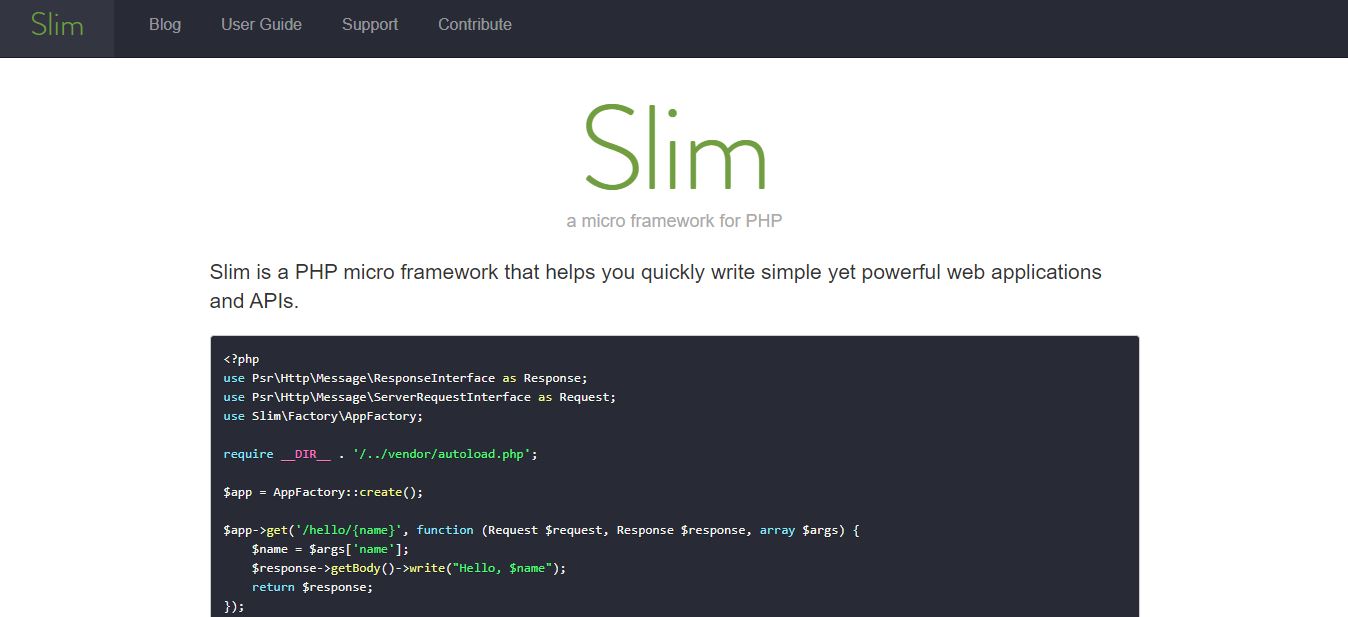
The slim framework is another framework that helps developers to create potent web applications and API. This minimal microframework also facilitates in writing simple. It is relatively a new web framework PHP. Developing with slim is very easy and nowadays becoming popular because of its simple design and vigorous speed.
Features
- Used to build lightweight and RESTful APIs.
- It has add-on features such as URL handling and routing, HTTP caching, session, etc.
- Create simple but powerful web applications.
Pros
- It is beginner-friendly documentation
- Can be easily maintained
- Best for small web applications that do not require a full-stack PHP framework.
Cons
- It unnecessarily loads the server with a large PHP file.
- Dependency injection is too weak.
- Hard to use model properties.
9. Fat-Free Framework

Fat-free is an open-source framework, launched in 2006. It is the most potent and straightforward PHP micro-framework built for developing dynamic and speedy web applications. It also provides optional plugins that enhance its core functionality. It comes with packages for unit testing, CSS compression, open ID, etc.
Features
- It provides tons of packages for unit testing, image processing, data validation, etc.
- Supports both SQL and NoSQL databases.
- It lies between true micro-framework and full-fledged micro-framework.
- It helps to develop dynamic and robust web applications.
Pros
- It Comes jam-packed with packages.
- It supports multilingual development.
- It offers optional plugins to modify its core features.
Cons
- Default ORM does not support joints.
- A small community to help you with your problems.
- It requires front-end stack support.
10. FuelPHP

A sophisticated, modern, and highly-reliable framework, launched in 2010. FuelPHP is an extensible MVC PHP Framework that uses HMVC (Hierarchical model-view-controller architecture). It is flexible and offers modular support.
Features
- It has lightweight and sturdy ORM support.
- It provides security enhancements.
- It has a URL routing system, template, parsing, and caching system.
Pros
- Supports multiple applications on a single installation.
- It has a community-driven nature.
- It has a unique command-line utility.
Cons
- Not beginner-friendly
- The documentation guides keep on changing, making it problematic for the user to learn.
Conclusion
There are a variety of programming languages you can use, but PHP is still the best when it comes to server-side scripting. PHP framework simplifies a lot of tasks while developing web applications. Each framework has its own merits and demerits. With a smart selection of the PHP framework, you can skip a lot of groundwork and can get directly to create a web application.



